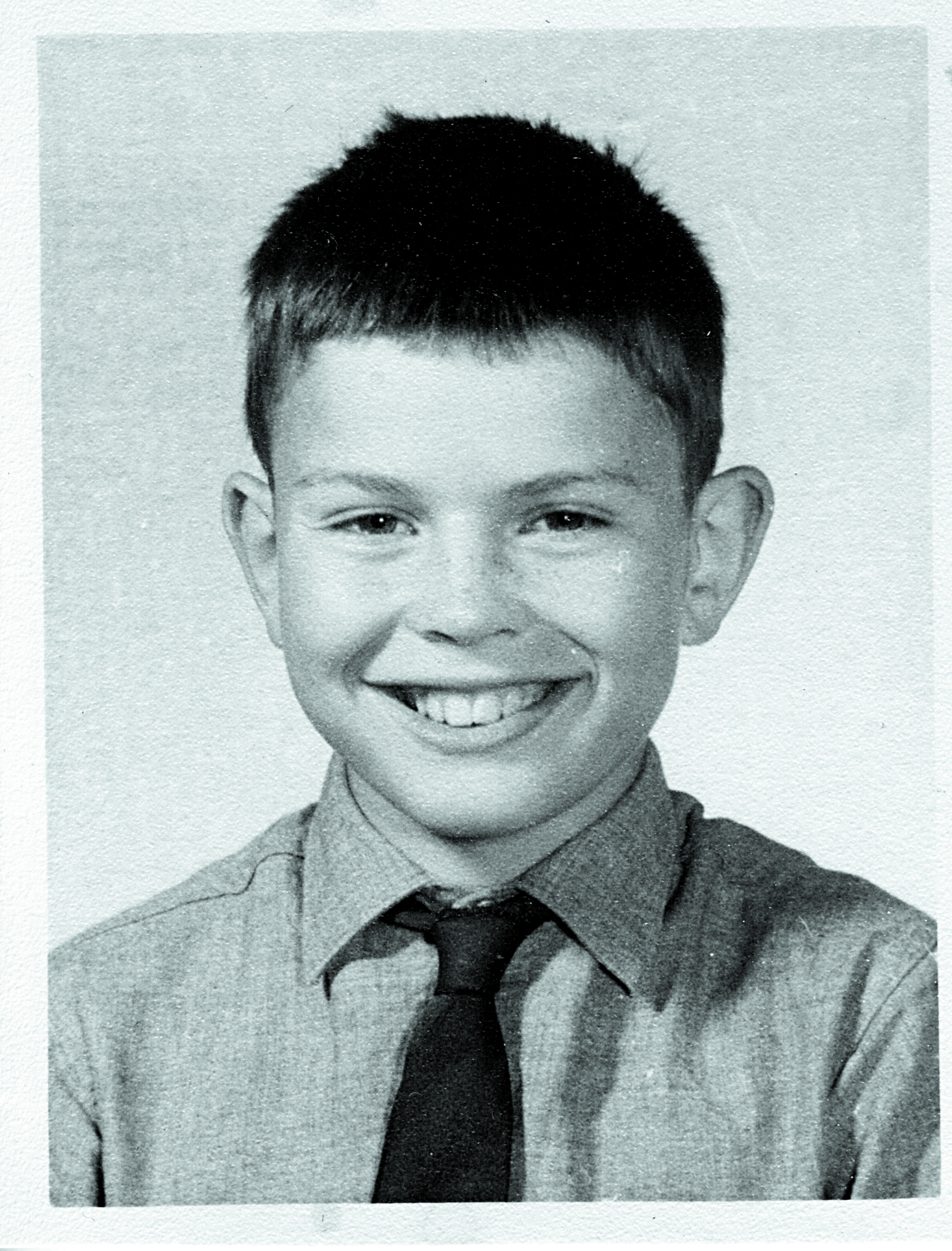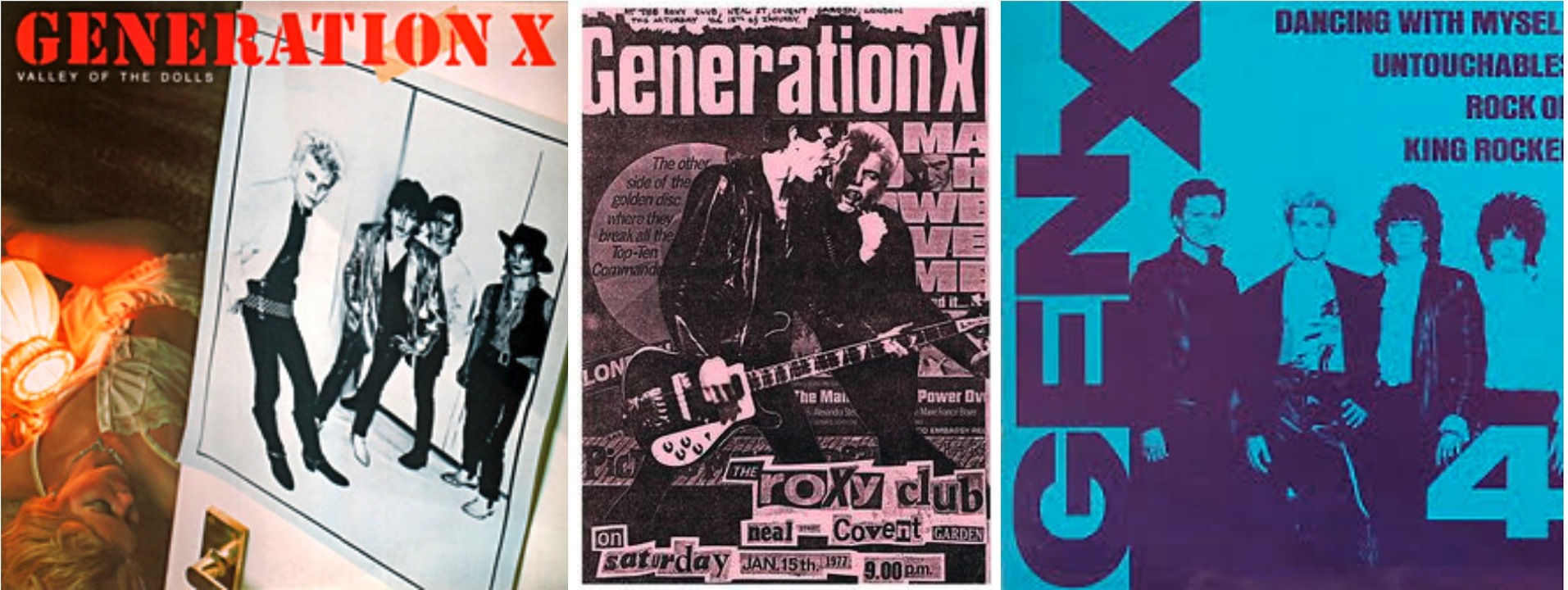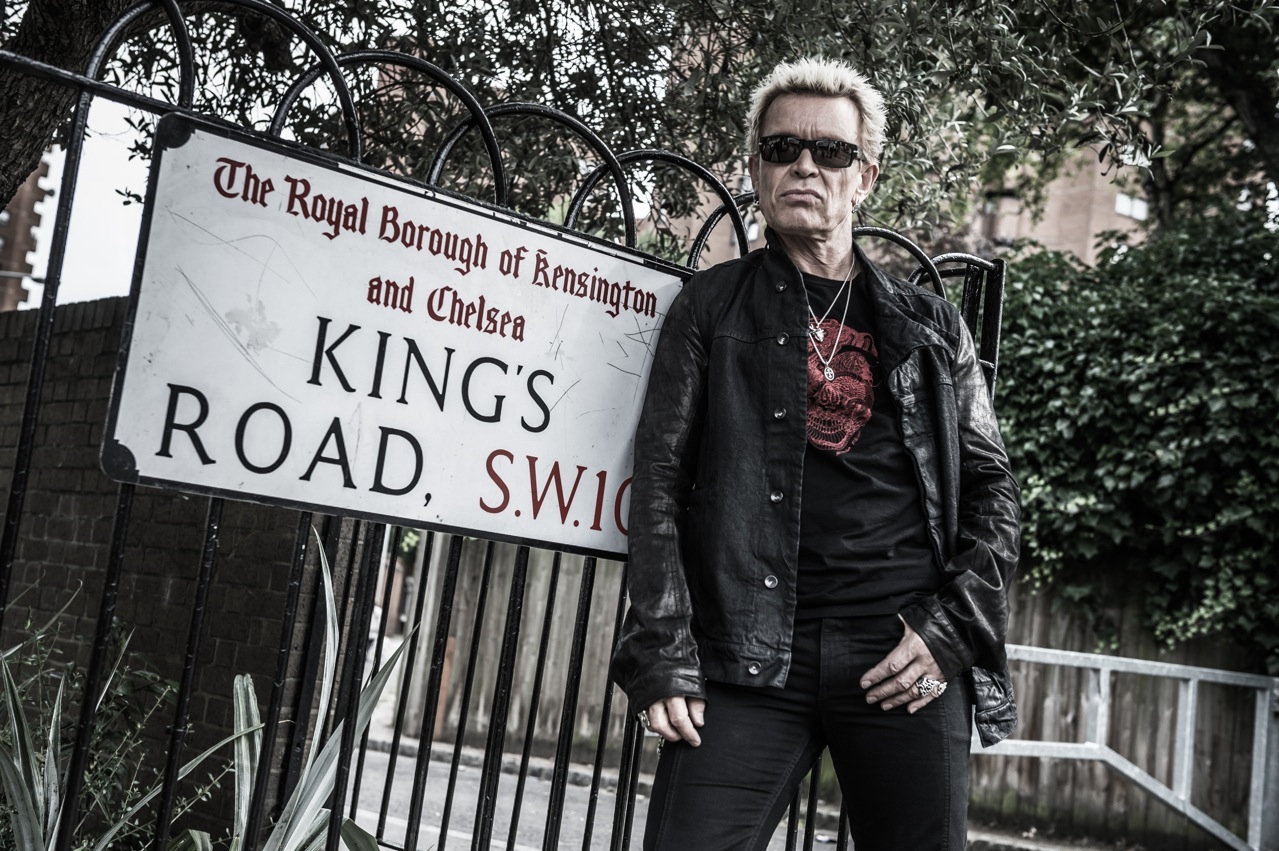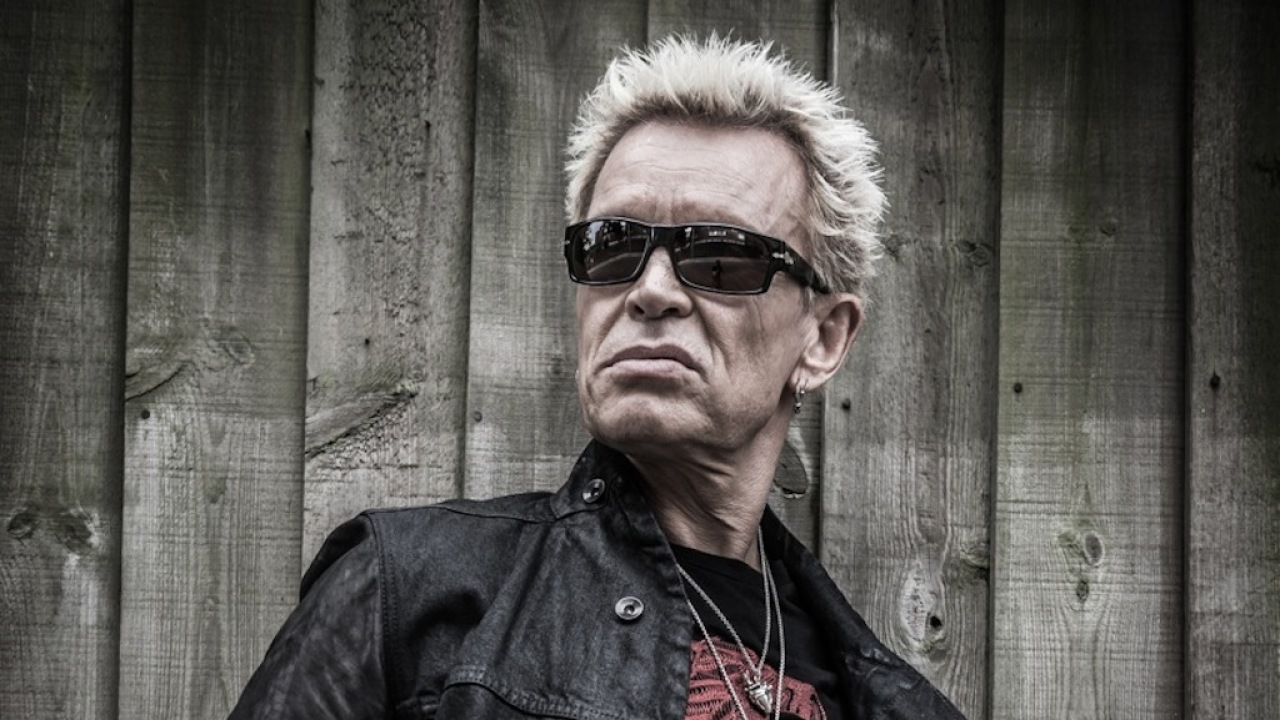Billy Idol is naked and smoking a large joint. It’s March 5, 1982 and the singer is working on his self-titled debut solo album in Los Angeles where he has rented a bungalow at the Chateau Marmont hotel on Sunset Boulevard. Here he sits, quietly getting baked on a bright Friday afternoon. There’s little chance of privacy, as the door has been kicked off its hinges.
The television has been smashed and the windows are broken. Idol is struggling with heroin addiction, and routinely guzzles tequila by the litre in order to take the edge off withdrawal. State law forbids the sale of alcohol between the hours of two and six in the morning. Earlier he awoke at 3am to discover that there was nothing to drink and no way of obtaining a fresh bottle. His acute displeasure at this situation resulted in determined property damage. As a consequence Idol has been informed by a member of the hotel staff that he is no longer welcome to stay and now there are policemen outside. Curiously, they seem to take no notice of the unclothed 26-year-old vandal.
It transpires that the previous night another hotel resident, actor John Belushi, had no problem in getting hold of narcotics, and has been found dead in the Marmont’s Bungalow 3. As hotel employees are absorbed in dealing with this A-list corpse, the matter of evicting Idol ceases to be a concern.
Today, at the age of 58, Idol talks about this grim stroke of luck with the wry amusement of somebody who could quite easily have had a paramedic solemnly covering his rictus sneer with a blanket on several occasions.
It’s another warm afternoon in another hotel, this one overlooking London’s Kensington Gardens. Idol is here to talk about his new album, Kings & Queens Of The Underground, and an imminent autobiography, Dancing With Myself. Sitting on the edge of a sofa, he speaks in a warm growl, punctuated by a laugh that sounds like James Brown doing karate chops. Unsurprisingly, Idol has a ready supply of hair-raisingly debauched anecdotes from his 80s heyday. But let’s start back when he was a boy called William Michael Albert Broad. One of his school reports back then contained the frank assessment for chemistry lessons that “William is idle”. This would later prove inspirational for a fledgling punk rocker wanting a cool name. Then, though, it just meant that young Broad wasn’t much cop at science.

What values did you learn from your parents?
If you love something, work hard at it.
Did your dad love his job?
He was a salesman and he loved that, though I don’t know if it mattered too much to him what he was selling. I would go with him sometimes. My dad came alive when he was selling. It was like a stage act, if you know what I mean. Not that he was crazy or wild or anything like that. At one point he worked with medical equipment, those first rippling beds. This was all back in the sixties. I’m sure, in a way, I’m a salesman too. It’s just that I sell my own product [laughs].
You grew up all over the place due to your dad’s profession.
Yeah. You’d be getting settled and felt like you belonged somewhere, and then we would move, so you’d have to uproot and get to know a whole new set of friends. When I was three we went to America [to Long Island, New York] for four years. Then we lived in Dorking for a little while before moving to Goring-by-Sea, outside Worthing, for about eight years. Then we moved up to Bromley.
Did your mum work?
She actually worked with my dad when he started his own power tool hire/buy company. My mother ran the ladder hire part of that. It was the funniest thing, seeing my mum, a little Irish lady, dealing with these construction people. She was fantastic.
Were you much of a sportsman when you were at school?
I would usually be on the cricket team or the football team. I even played rugby; I was a hooker for the first year and after that I was fly-half. I got out of the scrum. But then, in the third form or so, we really decided that, you know, fuck this. We weren’t going to be professional sportsmen. We were more into music.
I read that when you were ten you got kicked out of the Scouts for kissing a girl. Did that really happen, or was it a bit of myth-making on your part?
No, that’s absolutely true. It broke my mother’s heart because the Scouts were connected to the school, which was C of E. My mother was very religious, so she was very involved in it all. Yeah, it was the Scout summer fair or something and I was snogging this girl on the grass in front of everybody. They threw me out for that. Crikey, I should have got a badge!
You attended Sussex University for a year.
Yes, I did English Literature there. The poetry was Alexander Pope, so I was a bit bored with that – I preferred the Romantic poets – but you did Greek theatre and everything. You would do American literature as well. It was really interesting.
Didn’t you study philosophy too?
There was a smattering of that, because to do the American literature you had to take this philosophy course. It was British philosophy so it was all semantics. Do you believe the sun is there? The difference between knowing and believing. Very heady.
Are you one to be troubled by existential angst?
I’ve never really known exactly what the existential thing is, one hundred per cent. Being And Nothingness and all that. It’s more and more about Being than nothingness, I suppose [laughs].
What do you think when you look up at the stars and consider your place in the universe?
I suppose that I do have a feeling as if I’m where I should be. I’ve got an Irish background so I can’t help but have a slight mystical belief in things. Not so much that there’s a god or anything like that, but just that you’re in this world for some reason. I don’t really know anything more than that but I’ve always had a comforting feeling about things. It’s probably just my imagination doing that to make me feel okay.
Why did you quit university?
One of my friends from Bromley, Steve Bailey – Steve Severin he became, from Siouxsie And The Banshees – sent me a postcard saying: “We’ve seen the band we’ve been waiting for. Get back up here.” He was talking about the Sex Pistols. The thing about Sussex was that they actually liked it if you went there for a year and then went out into the world and worked. After that, if you wanted to come back you could. I joined a punk rock group so I didn’t need to do that.

Having put his formal education on hold, Idol was in the front row for the eruption of punk as a constituent of Sex Pistols cheerleading mob the Bromley Contingent. Soon he would take a more active role in the scene, fleetingly playing with a couple of bands before fronting the unthreatening Generation X. Formed in 1976, the group enjoyed moderate success and released three albums before disintegrating five years later. Idol decided to go it alone and moved to Manhattan, where his early career was masterminded by Kiss manager Bill Aucoin.
Just as Idol faced the realities of life as an aspiring solo artist on a weekly allowance of $200, a new television channel was launched that would be crucial in making him a superstar. MTV needed dynamic eye candy. And, once paired with raven-haired guitar daredevil Steve Stevens, Idol’s insouciant charisma and danceable raunch-rock ticked all the right boxes. A memorably literal promo for his White Wedding single rapidly elevated his profile and made a minor hit of his self-titled 1982 debut album. More effective still was the 1984 video for Rebel Yell. Shot at the Capitol Theatre in New Jersey, an aggressively cocksure Idol performs for a crowd seemingly hand-picked by teenage boys (“I put the hot-looking girls with the big tits up front,” director Jeff Stein later recalled). The single, and the 1983 album of the same name, had such mass appeal that Sesame Street subsequently featured an Idolesque puppet singing about a maverick letter of the alphabet: a Rebel L.
As a firm MTV darling, Idol became hugely popular. He was also a drug addict. After his third album, 1986’s Whiplash Smile, the decision was made to leave the temptations of New York behind and move to Los Angeles – where he continues to reside – in search of a more wholesome environment. He had been in a relationship with Perri Lister, formerly a member of risqué dance troupe Hot Gossip, since the turn of the decade. Lister gave birth to the couple’s son, Willem Wolf, in 1988. Idol’s public image as a sex maniac wasn’t just for show; the following year he had a daughter with another woman, Linda Mathis.
Did you ever feel guilty about seeing other women behind your girlfriend’s back?
Well, we were out on the road for a long time. The Rebel Yell tour was ten months. You’re out in the middle of nowhere, and in those days there were no computers or cable television, particularly, so one had to entertain oneself. And, of course, one usually used whatever there was in the audience for that. I loved Perri but I couldn’t help but have dalliances. Now I’m a lot different. I have a girlfriend who I’m very much involved with and I don’t want to be with anybody else but her.
So do you see your lifelong bachelor status changing any time soon?
[Laughs] I’m not giving everything up.
Have you ever tried Viagra?
Yeah, of course. You’re going to use anything you can, just in case. You’ve got to satisfy those ladies.
Apparently you once described Whiplash Smile as “one of the most soulless pieces of shit I think anybody could make”. What made you say that?
I don’t think that at all. I don’t know quite why I would have said that. I was very drug-addicted at the time. I was trying to get off heroin and I ended up taking tons of blow.
By ‘blow’ you mean cocaine?
Yes. I ended up smoking it. But I did get off heroin for a while by doing that. There was a no-holds-barred feeling about the eighties. We were partying as if it was the end of the world, as if tomorrow there’d be no more drugs and there’d be no more fun. There would be nothing. We were all living in a fool’s paradise.
Were you ready for fatherhood?
Who’s ever ready for that? That was another reason… When you do have children, you wonder what you are truly saying to them by your own actions. I didn’t want to say that being an out-and-out drug addict is the way to be.
Would you have described yourself as a bad father?
I don’t think I was a bad dad. It’s just that I had my own problems, which I had developed because at one point I didn’t have to care about anybody or anything much except for myself. I had to make a decision: what do I truly love? Drugs were just a means to an end. They weren’t a reason for being.
Do you think that moving to Los Angeles was ultimately good for your health?
The long-term effects of it have been healthy. It’s just that it took me a long time to get free of the addictions I’d built up in the eighties, although to a certain extent you’re never clear of it. It’s always going to be in the background, a danger to you. Look at Philip Seymour Hoffman. He was clean for twenty-three years and then… [the actor died of acute mixed drug intoxication in February 2014] That can always happen to any of us. But I’m not sober [laughs]. That would be very difficult for me. I’m just trying to keep things way on the down-low. I like to have a little bit of wine with dinner, and I smoke pot occasionally.

In 1989 Idol’s menu of intoxicants was considerably livelier than just a small glass of Merlot or the odd hit of marijuana. Having split up with Perri Lister, he took a holiday to Thailand and went totally berserk. The trip came to an abrupt end when, having rampaged through three hotels to the tune of about $20,000 in wrecked suites, Idol was sedated by military personnel and forcibly removed from the country.
**What exactly happened in Thailand? **
We went there to have a whale of a time – a sex holiday, really. But it got out of hand. Bad things started to happen.
Who’s ‘we’?
Me and a mate. We were just going to drink and not take any drugs. After about a week, drinking all the time was getting really heavy so we asked this cab driver if he could get us some blow. He went off and came back with this thin vial. It was six or seven inches long. We looked at each other, like, “What do you think this is?” Because cocaine doesn’t usually come in a long thing like that. My friend put his finger in it and had a taste [mimes gingerly dabbing a sample on to his tongue]. It wasn’t blow.
What was it?
The strongest heroin going. You only needed a pinprick and you were out of your mind. Then we had to work out, well, how are we going to take this? We needed some tin foil [to smoke it off], so we went around all the supermarkets in Bangkok looking for that but they don’t have it there. We ended up using the foil from the chocolate bars at the hotel. This stuff was so strong and severely addictive that we then had to get off it before we could fly back home. It’s a fourteen-hour flight, and there’s no way you could do that while coming off heroin [laughs]. You had to get semi-well so you weren’t shitting yourself. We went to a pharmacy and got all these downers to knock ourselves out until we were kind of normal again.
How long did that process take?
A couple of weeks. The only trouble was that we’d got a lot of Valiums and heavy tranquilisers. I don’t do well on tranquilisers at all. It just made me change personalities completely. I would become violent and start smashing things; I’d been lifting weights so I was massively powerful. I think we went through a few hotels like that before the Thai army escorted me out of the country on a gurney [laughs].
- Toby Mott - Oh So Pretty: Punk In Print 1976-80 book review
- (Billy) Idol Gossip
- Billy Idol: Kings & Queens Of The Underground
- Download 2015: Blackberry Smoke & Billy Idol
Things were no calmer at home. Immediately upon completing work on a fourth album, 1990’s Charmed Life (which featured a cover of The Doors’ LA Woman), Idol was fortunate not to lose a leg after being knocked off his Harley-Davidson Wide Glide. Barely recovered, he stoically toured using a stage set dominated by a massive prop fist with the words ‘Rude Dude’ etched across the knuckles. Slowly, mechanically and utterly predictably, this hand would rotate to a palm-up position before the middle finger was raised. It might as well have been waving goodbye to an era of ostentatious abandon as rock music was being taken in a less frivolous direction by bands such as Idol’s support act, Faith No More.
Away from his musical activities Idol had two high-profile film projects lined up for release in 1991, both of which were derailed by the severity of his crash injuries: the part as one of Jim Morrison’s cronies in The Doors was significantly reduced; a leading role as T-1000, the liquid metal assassin pitted against Arnold Schwarzenegger in Terminator 2: Judgment Day, had to be abandoned altogether because he was unable to sprint.
Idol’s fifth record, 1993’s Cyberpunk, was a disastrous avant-garde attempt at reinvention. The reception to it was so bad that it took him a full 12 years to release his next album, Devil’s Playground.
Having overdosed twice in 1994, Idol finally realised that enough was enough and took steps to clean up his act. A few years later his career got an unlikely shot in the arm. A spirited cameo appearance as himself in the 1998 film The Wedding Singer – a typically high-concept Adam Sandler comedy set in 1985 – demonstrated that Idol hadn’t lost his sense of humour. It also didn’t hurt that White Wedding featured prominently on the soundtrack. In common with many of Idol’s biggest hits, the song stood the test of time and remains classic rather than kitsch.
How did you end up appearing in The Wedding Singer?
Adam Sandler was making a number of films that I would take my kids to see. They sent me the script and it was really amusing … and I was young enough to play myself as if it was the eighties.
You’re still in good nick. How have you kept your boyish good looks?
Fuck knows [laughs]. One thing I did was start working out in 1987 because I wanted to put back in what I was taking out. It’s crazy, the whole thing, but even though at times I was destroying myself I was building myself up as well. It’s this funny dichotomy of being me.
When did taking drugs stop being fun for you?
They haven’t really stopped being fun. It was just a question of what did I want to end up like? Did I want to end up dead, mad or in prison? None of those were particularly appealing, and I didn’t think that continual rehab was good.
Did you ever go to rehab?
I did go once for five days but I got myself out of it. I really didn’t like it at all. What was right for me was to control myself. I had to come to a place in my mind where I put all that stuff on the back burner.
When did you last do hard drugs?
The last time I smoked coke was 2003.
More recently than I imagined.
Yes. I was always falling off the wagon and occasionally going back. I would find out where you could get it from or something like that. Most of the time now I don’t know where you can get drugs. That’s what kind of stops me from doing it [laughs]. If I knew I’d probably be straight back getting them!
When you were working on your autobiography, were there any parts of your life that you found difficult to write about?
Well, the very things we’ve been talking about were a little difficult.
You turn sixty next year. What’s the best thing about getting older?
Hopefully you do kind of accept things about yourself and come to terms with them, your predilections or whatever you want to call them. In a way I’m lucky. I’ve got a great musical past to live on and, possibly, with this record we’re putting out, it’s a little bit of a step forward for me. I shouldn’t even be alive, really. It’s all very exciting.
This article originally appeared in Classic Rock issue 203.
